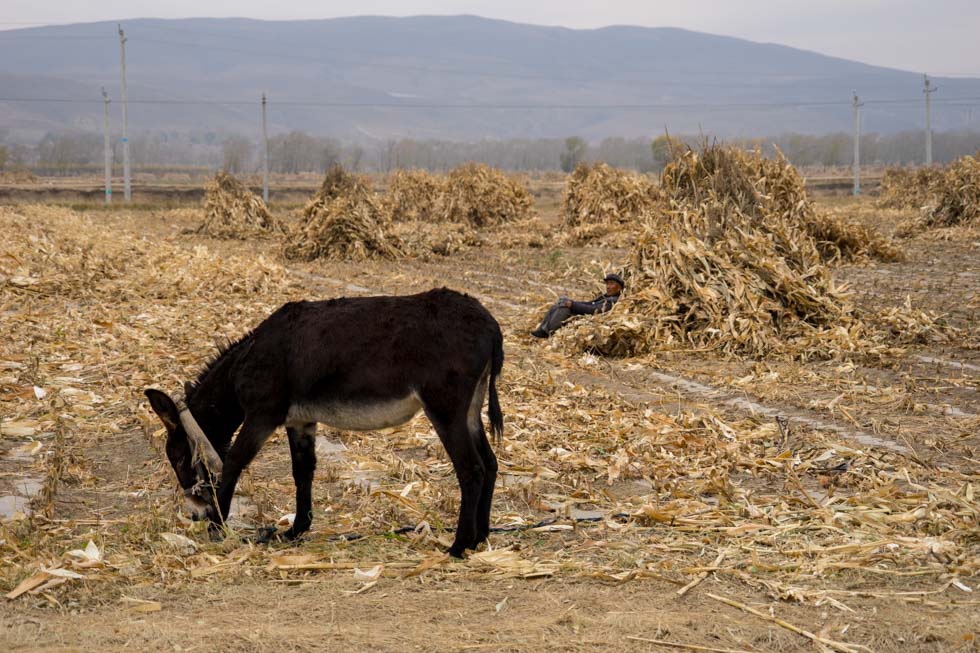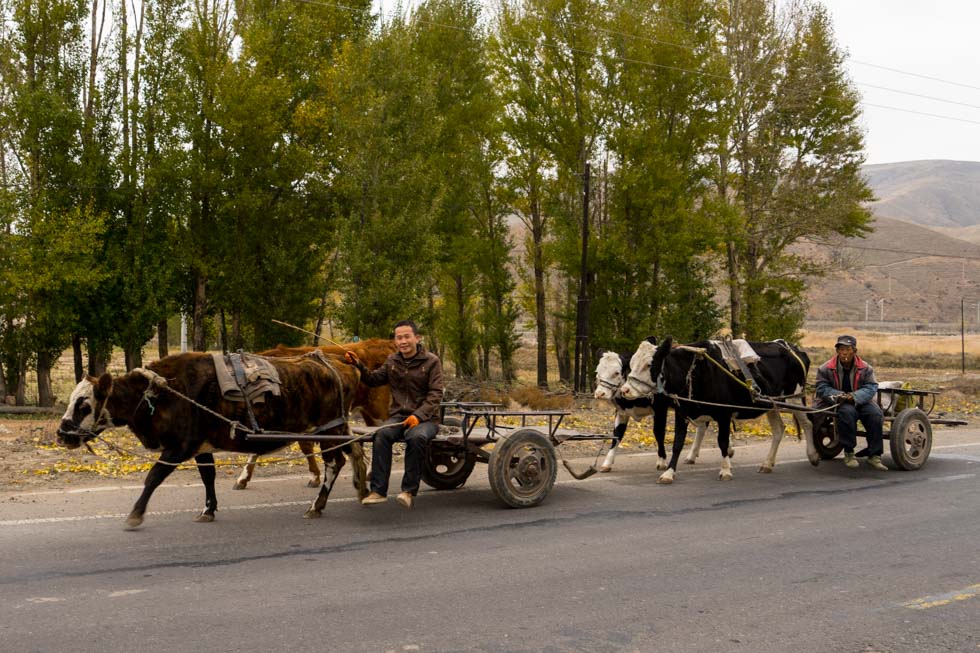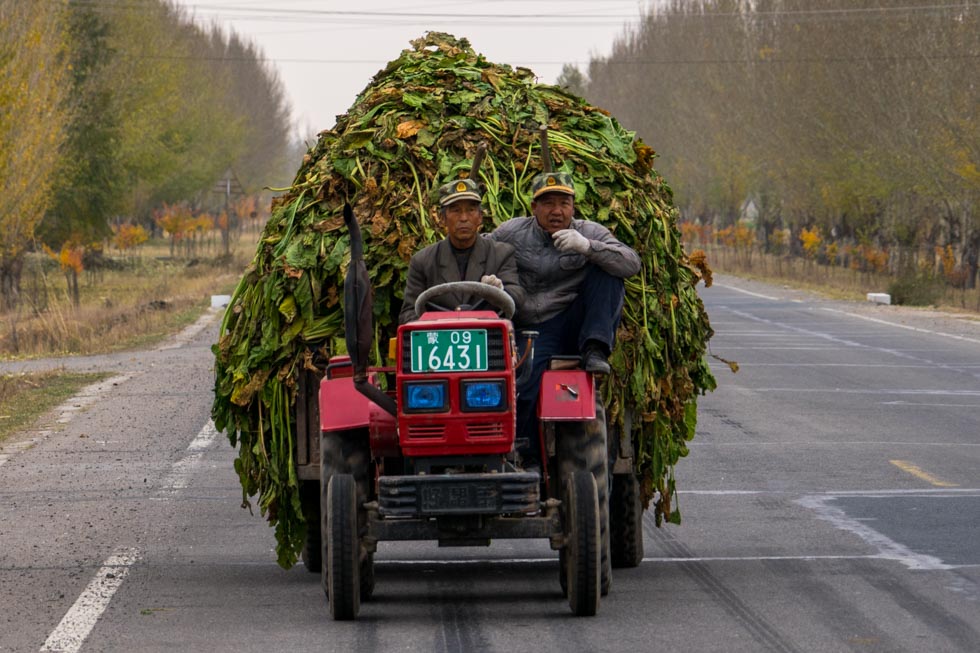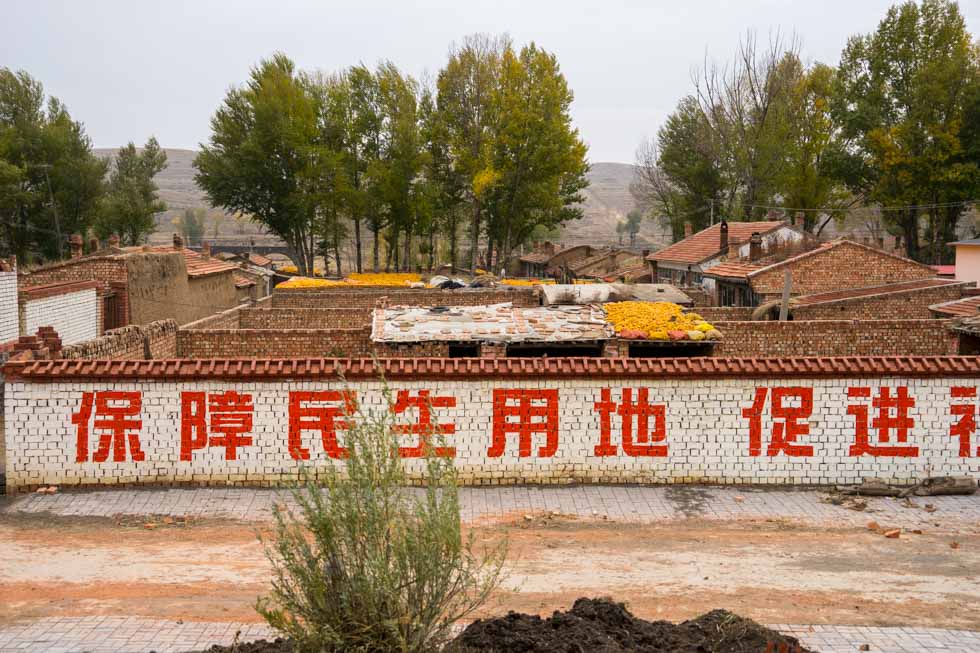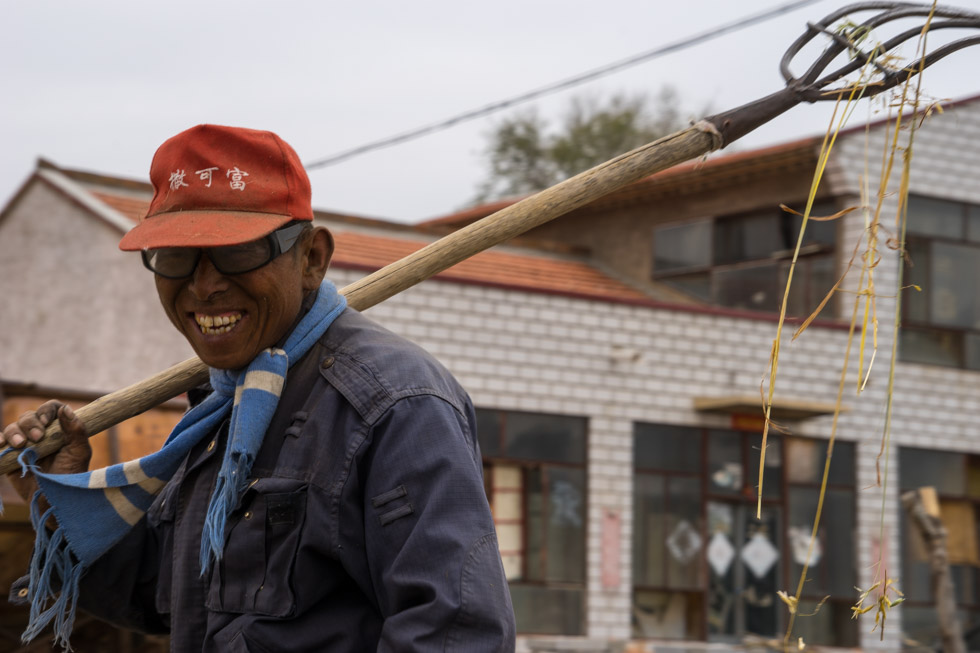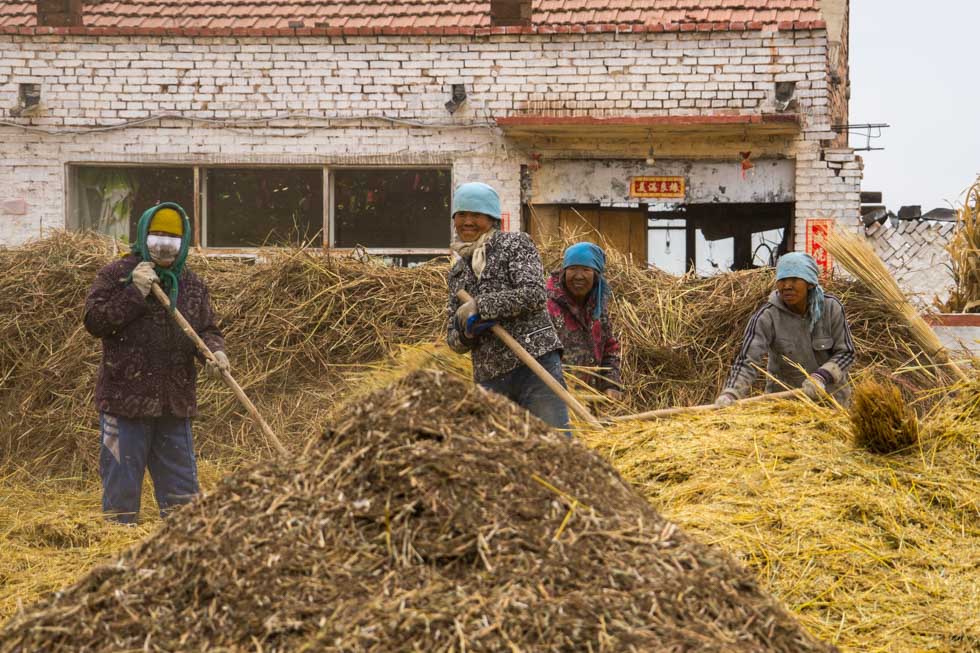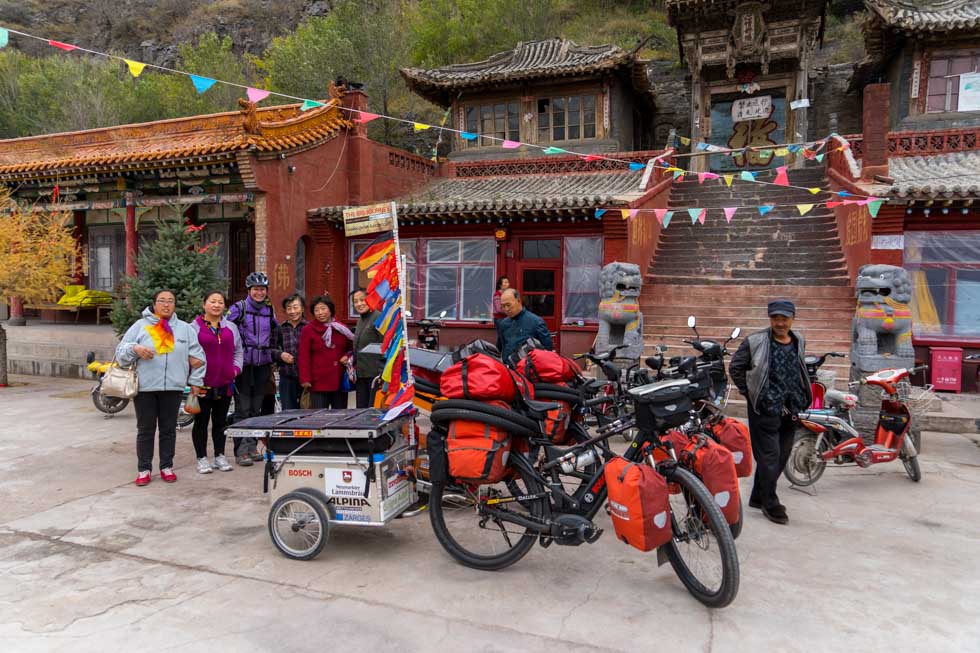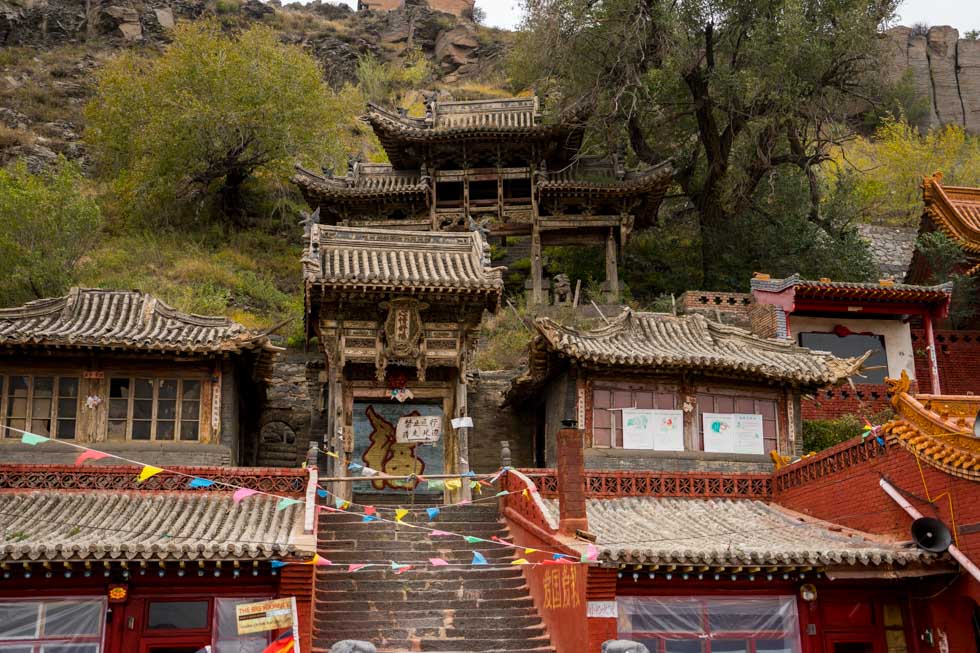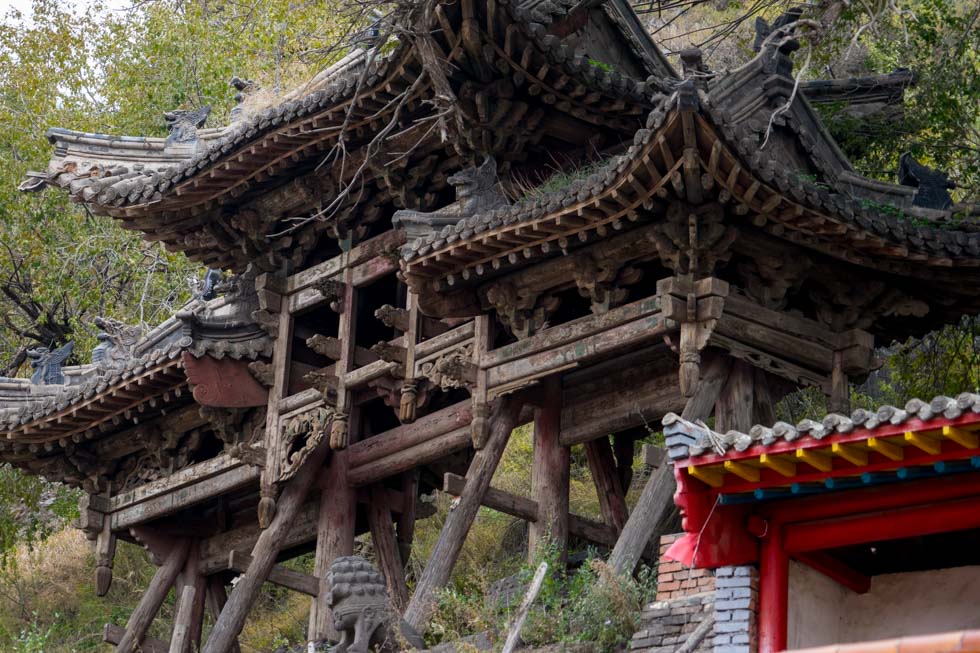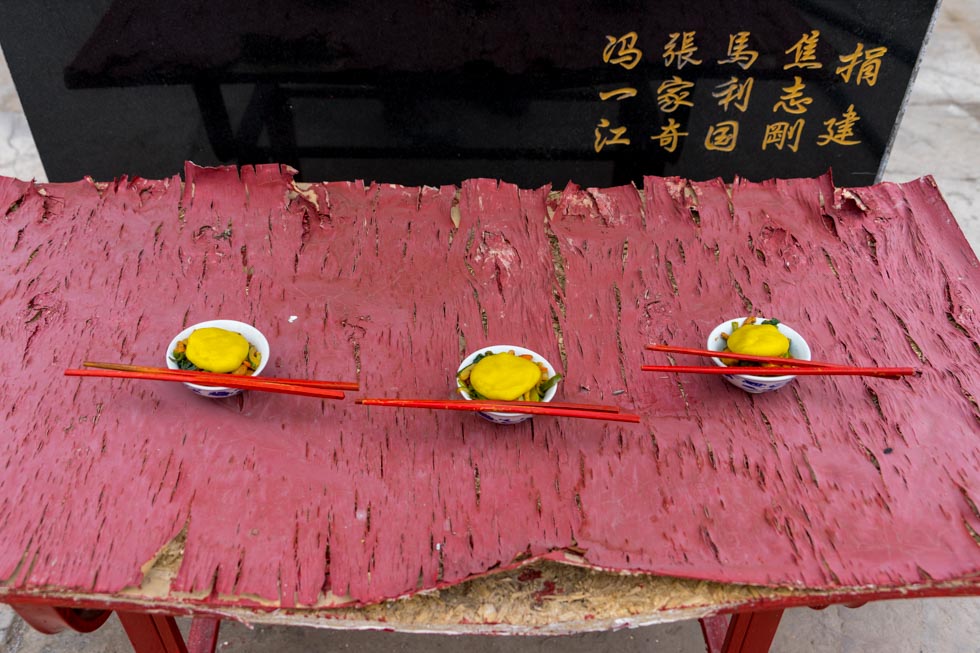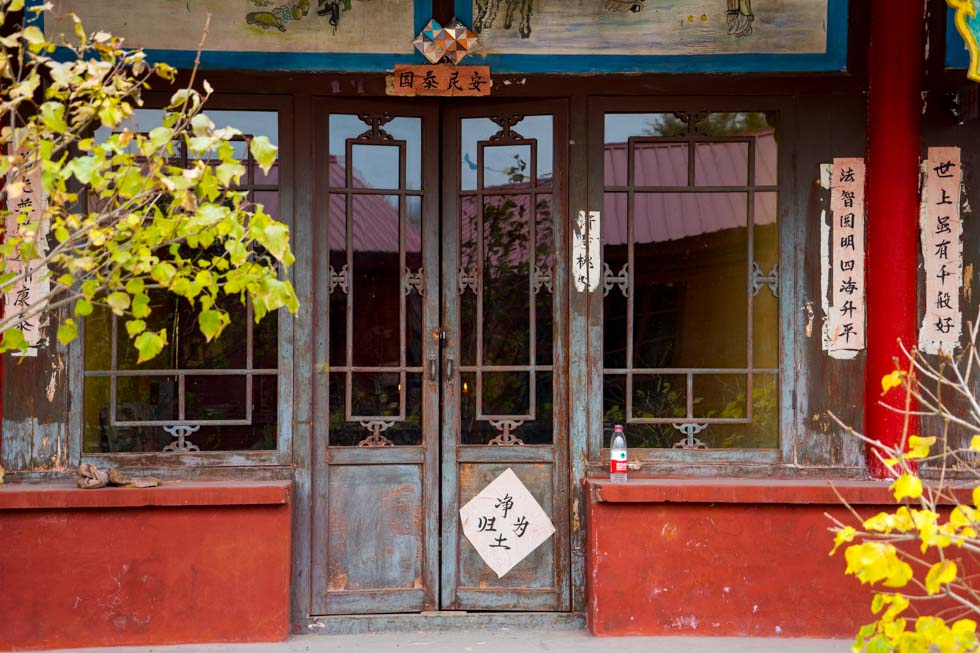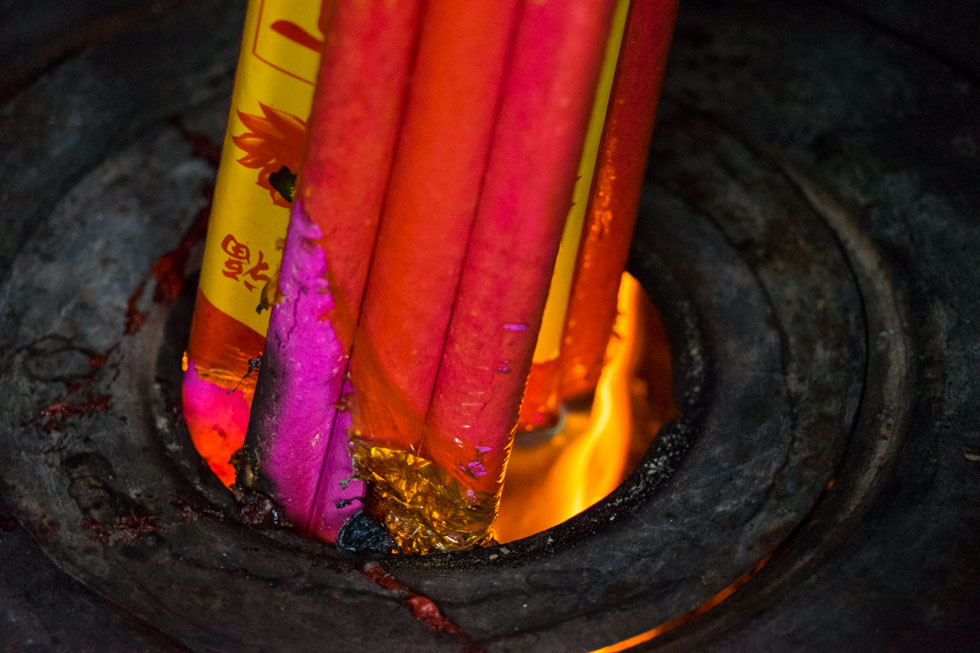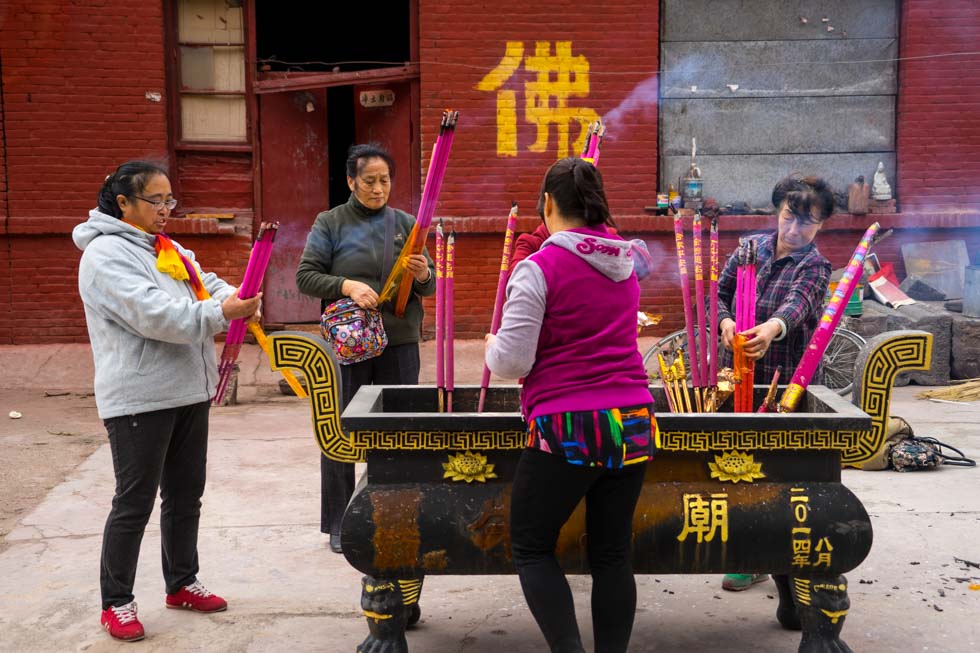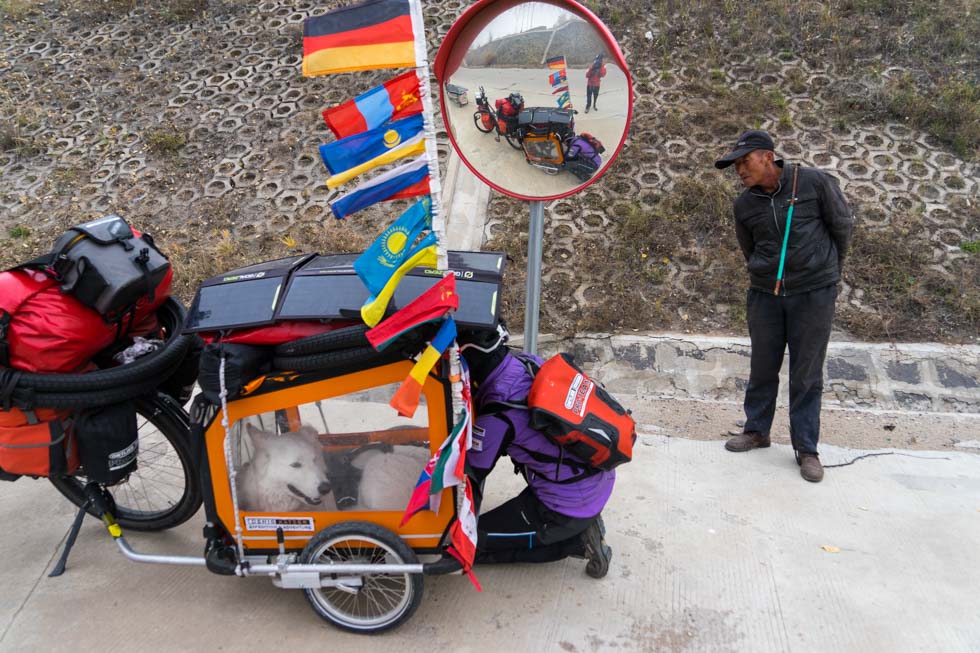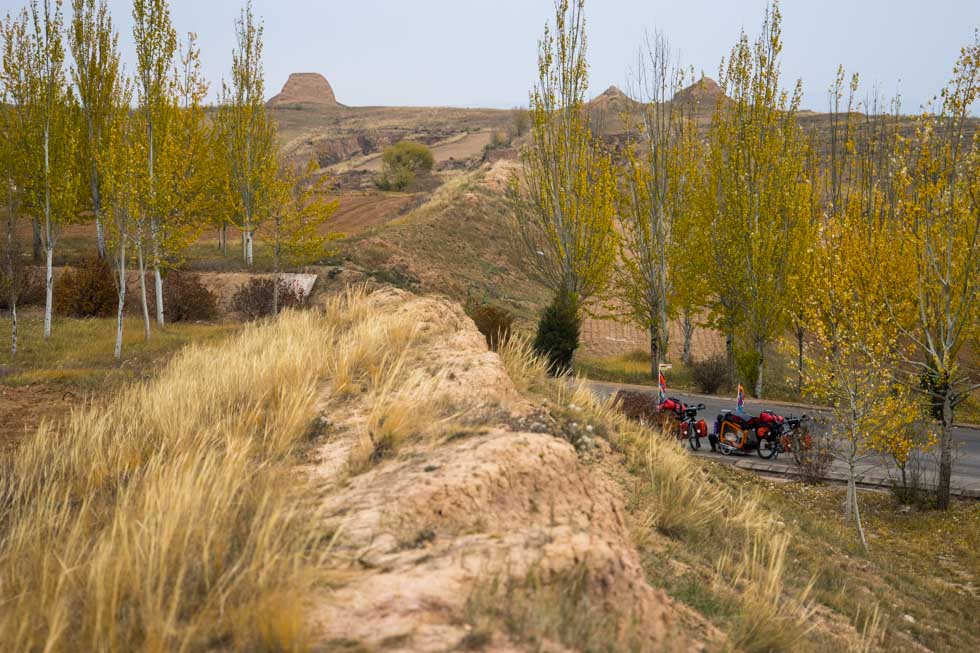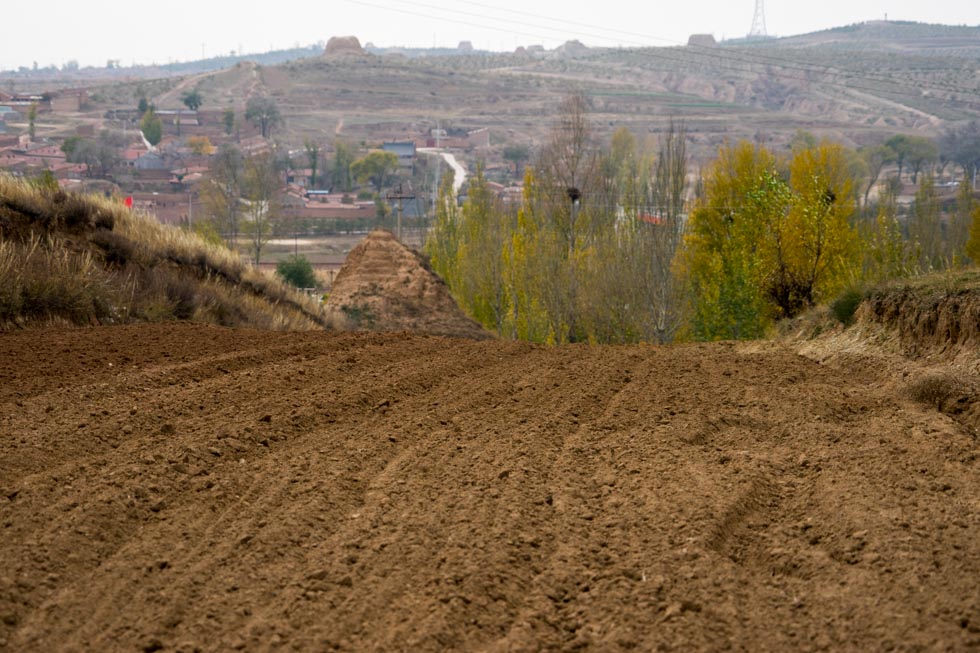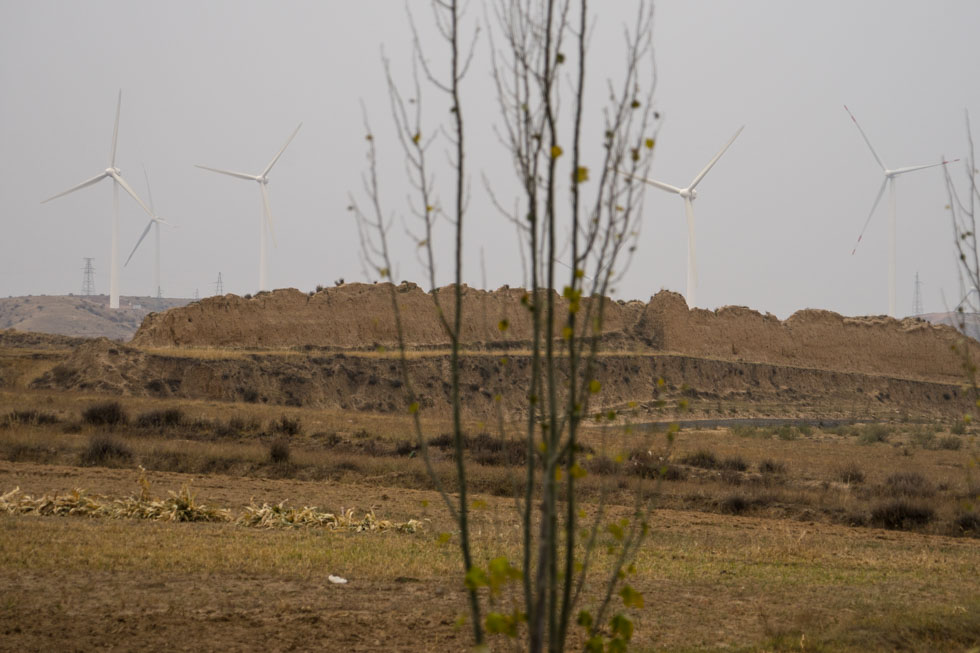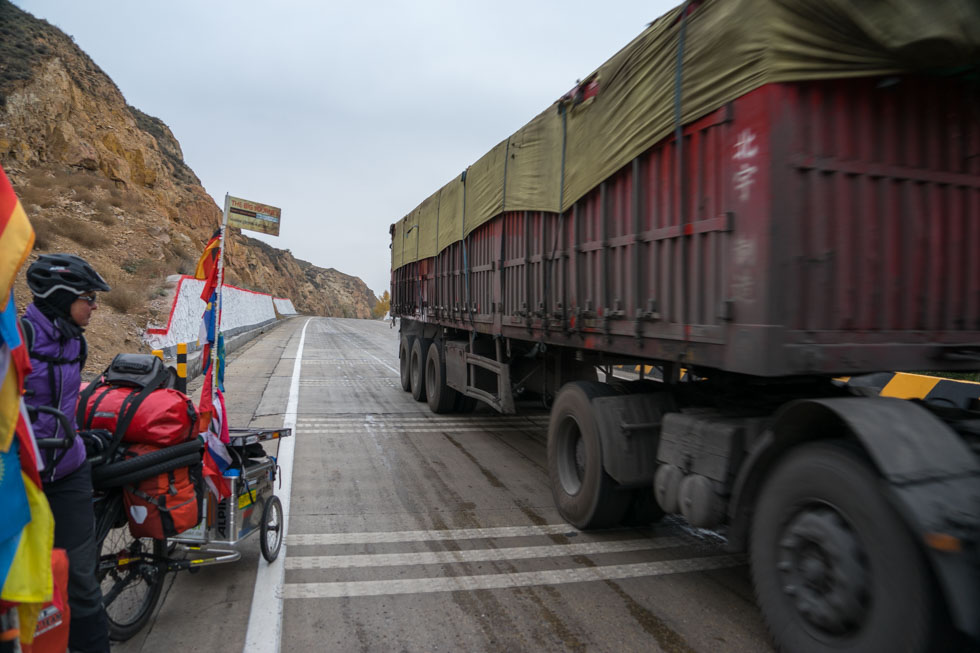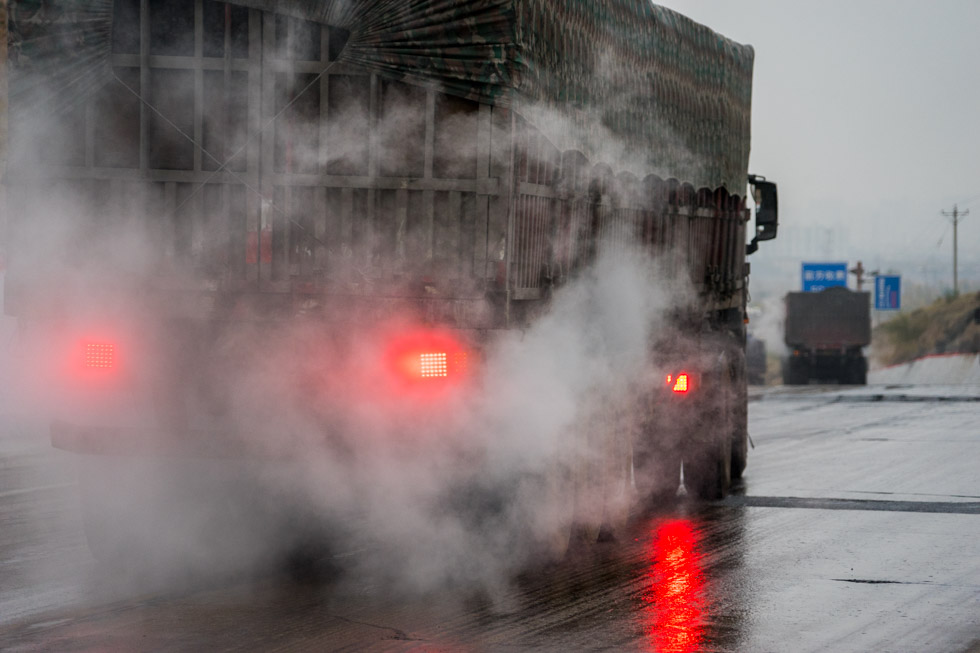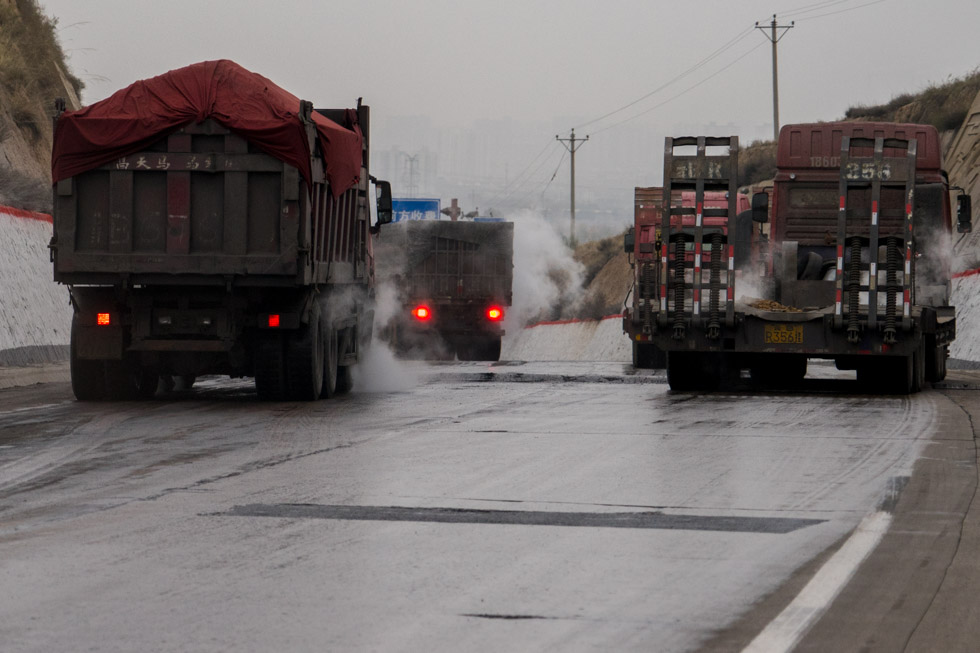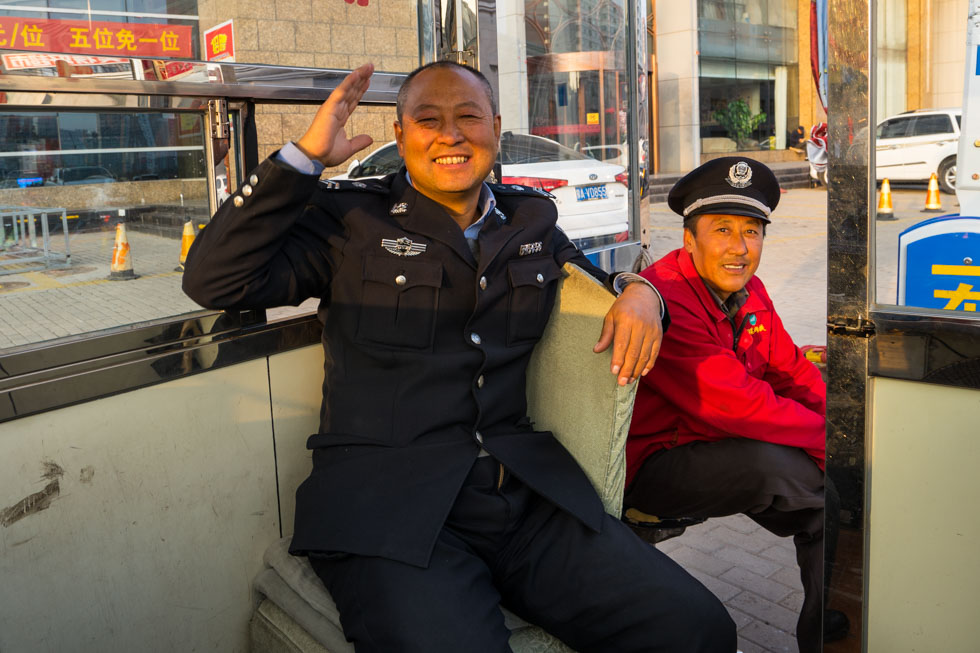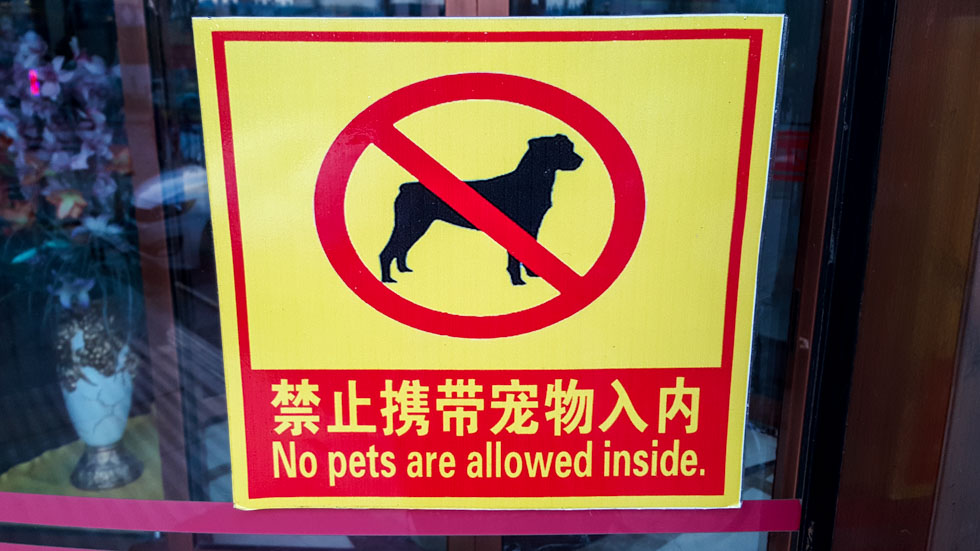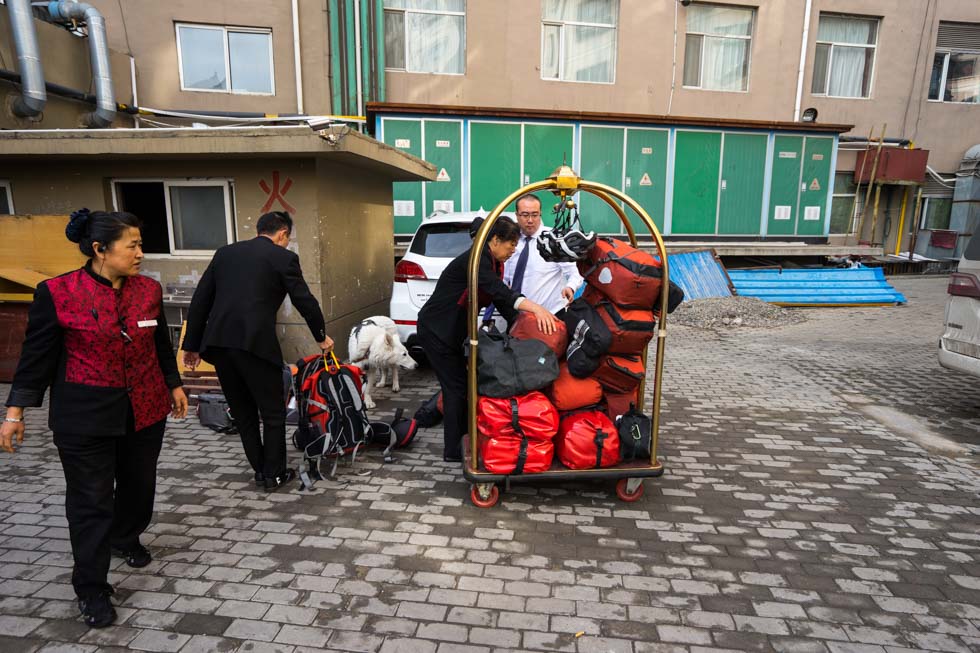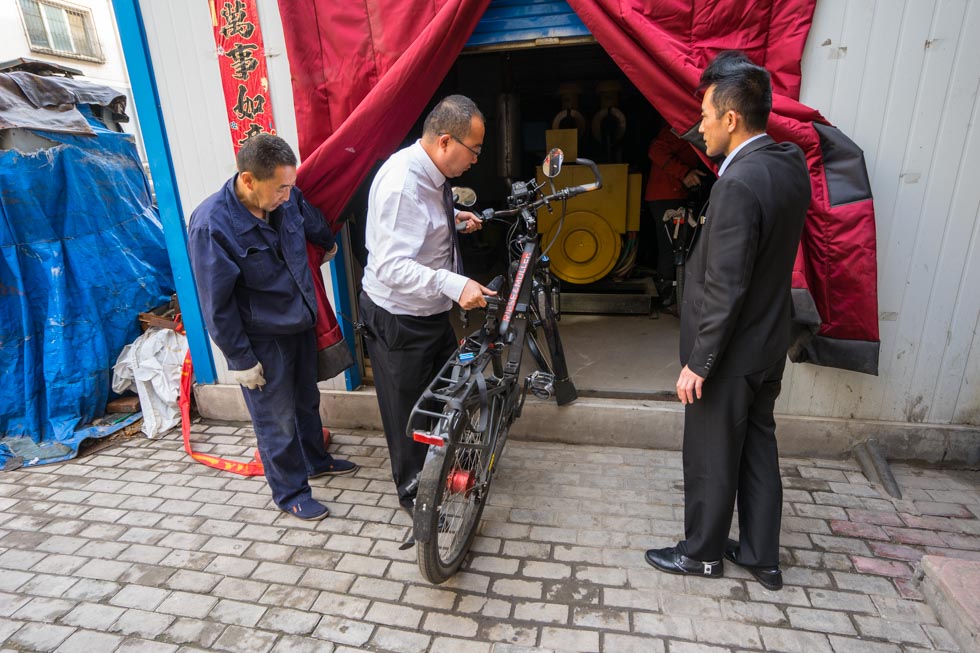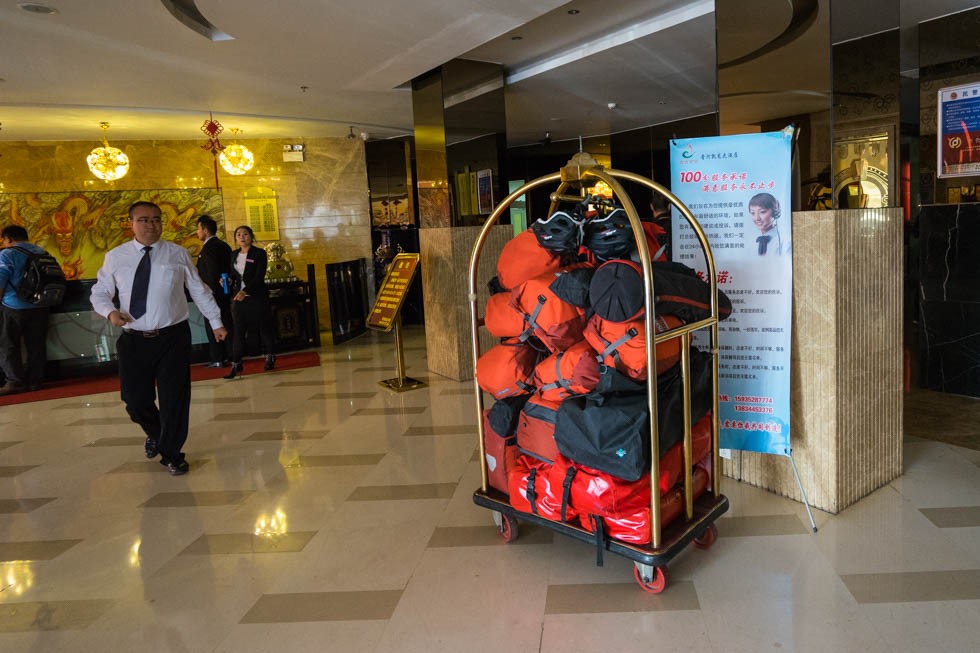
Great Wall of China – Smoking tires – Slaughtered dog
N 40°06'55.3'' E 113°18'08.9''
Date:
21.10.2015
Day: 115
Country:
China
Province:
Shanxi
Location:
Datong
Latitude N:
40°06’55.3”
Longitude E:
113°18’08.9”
Daily kilometers:
98 km
Total kilometers:
9,949 km
As the crow flies:
74.22 km
Average speed:
22,8 k3
Maximum speed:
51,4
Travel time:
4:24 hrs.
Soil condition:
Asphalt
Maximum height:
1.400 m
Total altitude meters:
6.100 m
Altitude meters for the day:
550
Headwind Wind force: 6
45 km/h
Tailwind Wind force: 6
45 km/h
Sunrise:
06:42 am
Sunset:
5:41 pm
Temperature day max:
11 °C
Night temperature:
4 °C
Departure:
10:00 a.m.
Arrival time:
5:00 pm
Total plate tires:
8
Plate front tire:
2
Flat rear tire:
5
Plate trailer tire:
1
(Photos of the diary entry can be found at the end of the text).
We leave our concrete accommodation in 7°C, with cloudy skies and the wind at our backs. Harvesting is still going on to the left and right of the road at the end of October. The farmers toil in their fields in a stooped position. We often come across ox carts, donkey carts and tractors heavily laden with maize and cabbage. Their drivers return our greeting after some initial shyness. We are usually given an open laugh. We pass small villages where the stalks of maize plants are being chopped up by loudly clattering machines. As I photograph a group of farmers at work, one of them shoulders his pitchfork and approaches us with a friendly smile. He marvels for a few moments at the wheels, which must look to him as if they were the vehicles of aliens. Then he lifts his thumb up and says goodbye to us with a friendly laugh.
Mother Earth’s skin folds in front of us again, so that we have to pedal our horses over hills again. With a population of around 310,000, we reach Fengzhen, the last major city in Inner Mongolia. On the outskirts, we have to stop at an intersection to let oncoming traffic pass. Right next to us, three Chinese men squat on their heels and cut open a dog’s belly with a knife to remove its intestines. It is obviously slaughtered for consumption like a goat or sheep. Before we are gripped by horror, the traffic clears the way and we continue our journey through this interesting land of contrasts. My thoughts turn to the scene I have just witnessed and I ask myself why the consumption of dog meat causes such disgust among us Europeans. People in northern Europe ate dogs as early as the Middle Stone Age, especially in the Neolithic period. Even in Roman imperial times, dogs were an everyday meat resource. According to written sources, dog meat was not uncommon in Burgundy, Gaul and the Rhine region in 869, and dog meat was eaten in Tyrol, Carinthia and Styria. At least this is documented in written sources from 1277. Well, you could say it was all a long time ago and we Europeans have evolved over the course of history. That may be true, but when you consider that in the first quarter of the 19th century there is evidence of dog meat being eaten in Saxon villages, we Europeans should no longer act out against the customs and traditions of other countries as if they were barbarians. Even Wilhelm Busch described the slaughter of dogs in a Munich picture book in 1866. In Germany, dogs were even offered as a delicacy on festive occasions in some social classes. From 1870 to 1871, dog dishes such as shredded dog liver, dog shoulder fillet in tomato sauce and dog leg garnished with young rats were found on menus in the city of Paris. Even now you could say that people in 1870 lived differently from modern Europeans today, but does that also apply to our grandmothers and grandfathers? In the cities of Munich, Breslau and Chemnitz, almost 43,000 of our beloved four-legged friends were killed and offered for consumption between 1904 and 1924. It was absolutely legal by law and there were even meat inspectors. A ban on dog slaughter was only enacted in 1986, which sounds unbelievable to me.
Link to the movie trailer West New Guinea:
https://www.youtube.com/user/deniskatzer
Link to the picture gallery West New Guinea:
http://www.denis-katzer.de/galleries/?name=westneuguinea
Apart from that, dogs and horses were eaten in many wars and emergency situations, at least when hunger forced people to do so. Sled dogs were also used as meat provisions on expeditions such as Roald Amundsen’s South Pole expedition as soon as they were too weak, sick or no longer needed.
In China, it is estimated that around 20 million dogs are killed every year, and dogs are also on the menu in Korea, China and Vietnam. The meat is usually considered a specialty and is expensive compared to other animals. But dogs are also eaten in Laos, Myanmar, Malaysia, Ghana, the Philippines, Indonesia, Thailand and the Congo.
Here, too, it is important not to judge or condemn other peoples and cultures, because we are all sitting in the familiar glass house from which we should not throw a stone. I am thinking here of the phenomenon of the rejection of horse meat in most countries in northern Europe, the ban on killing cattle in India, the deep aversion of today’s Europeans to dog and cat meat and the pork taboo in Islamic society. I myself am convinced that in the future, who knows when, mankind will look back with disgust at the living population of the earth today because we ate whatever animals we could. Perhaps the people of the future will look to the past just as we look to those who, for various reasons, ate their own kind in the last century. We call them cannibals. During an expedition to West New Guinea in 1989, I myself had contact with a ritually cannibalistic tribe who have now abandoned their old habits and will most probably never eat humans again.
Pondering my thoughts, I catch sight of an old, curved roof in the corner of my eye. “Wow!” I let out an exclamation of fascination. “Stop!” I shout immediately and pull the brakes after a hand signal. “What is it?” asks Tanja. “Look to the right.” “Oh, that looks interesting,” she replies, whereupon we let our bikes roll down the street, over a sandy footpath and through the old monastery gate. As soon as we cross the threshold of the old wooden gate, we find ourselves in another world. In an instant, the ugly noises of the street, the honking of horns, the constant loudspeaker announcements of street vendors, the rattling and roaring of mopeds and trucks, have receded into the distance. The scent of incense fills the air. Praying people kneel in front of Buddha statues or wave their pleasantly fragrant incense torches in all directions. We park our two-wheelers in front of the venerable, ancient wooden temples that were built into the mountainside a long time ago. Some of them look very old and seem to have survived the all-encompassing destruction of the Cultural Revolution that raged in China from 1966 to 1976. The visitors and some monks from the monastery surround us. They ask questions about where from and where to. They pull out their smartphones and cell phones and want to be photographed with the foreigners. Although an unpleasantly cool wind blows through the complex, we enjoy the peaceful stay and the pleasant vibes of the religious site. Unfortunately, time is pressing, as we still want to reach the city of Datong today, which was the capital of the country for almost a hundred years during the Wei Dynasty between 398 and 494.
“Are these the remains of the Great Wall?” Tanja calls out a few kilometers behind the town of Fengzhen. “Yes, they are indeed!” I reply enthusiastically. We stop immediately, put our roadtrains on the stands and climb onto the historical earth wall, which is cut by the road at this point. “We actually managed to cycle from Germany to the Great Wall of China on our bikes,” says Tanja in awe. “We have,” I reply and take a few pictures. We look out over the historic border fortifications, which stretch from here in a westerly and easterly direction across 15 provinces. It was built in the 5th century BC during the time of the warring empires as protection against the warring Chinese and was later intended to protect the Chinese empire from nomadic horsemen from the north. “How long is it?” Tanja breaks our almost reverent silence. “You mean the wall?” “Yes.” “According to the latest surveys, 21,198 kilometers.” “That can’t be right. That would take it halfway around the world.” “The real length is 8,851 kilometers. At least that’s what the Chinese authorities found when they measured it again in 2009.” “So why are you talking about over 21,000 kilometers?” “As I understand it, the wall consists of many different construction sections, different construction methods from different dynasties, some of which are not connected to each other. If you include the earliest construction sections from the 7th century BC, the 2,233 km of natural barriers such as rivers and mountains, and remember that the walls also zigzag, perhaps surrounding settlements and cities and crossing different parts of the country, there are different sections of the wall that add up to the enormous length.” “It looks pretty dilapidated here.” “Yes, that’s probably because the early sections of the wall were only made of beaten clay mixed with layers of straw and brushwood to make it more durable and smoothed out by the ravages of time. The wall, which was later built from natural stone, was misused by farmers for centuries as a source of stone for their houses. This is perhaps the reason why the wall in this area can only be recognized as an earth wall.” “And those are the remains of one of the signal towers?” “Yes, it is estimated that 25,000 of these towers, once up to 12 meters high, were integrated into the wall and another 15,000 individual towers maintained communication with the capital through signal fires.” “It’s crazy what you know.” “Ha, ha, I’m not a mastermind who learned something once and can memorize everything. I did a bit of research yesterday while you were asleep,” I admit. “Never mind, the main thing is that you know now. You’re a good tour guide.” “Thank you,” I say and enjoy the moment of being. “It’s a great feeling to be standing on the largest building in the world,” says Tanja after a few minutes of shared silence and calls Ajaci over, who has just stuck his nose in a mouse hole and is trying to chase the little inhabitant of the former fortification out. “Let’s keep going,” I suggest, whereupon I order Ajaci into his box. He doesn’t need to be told twice, jumps into his trailer like an arrow released from the string and makes himself comfortable with a grunt. “Ha, ha, ha. The prince is looking forward to continuing the sightseeing tour,” laughs Tanja.
Just a few kilometers further on, we leave Inner Mongolia and roll into the once rich province of Shanxi, which belongs to the cradle of Chinese culture and is on average higher than 1,000 m above sea level. According to my research, we will have a few meters of altitude to contend with here, as 67.5% of the province is dominated by mountains ranging from 2,000 m to over 3,000 m high. As the Great Wall of China extends to the north of this area and we are currently planning to follow it for around 700 km, we hope to come across preserved or interesting remains of the wall from time to time.
While almost 4 million Mongolians still live in Inner Mongolia, the number in Shanxi Province has fallen to around 12,000 Mongolians. On the other hand, the Han Chinese make up around 33 million of the population (over 99%). The remaining ethnic groups such as the Hui, the Manchu and the Miao, as well as the Mongols, are disappearing.
After the last few kilometers had been relatively flat, we suddenly had to pedal our bikes up the road incessantly. “What does your on-board computer show?” I ask. “30 km range on tour.” “My battery only has 15 km left.” “How much further to Datong?” “According to MAPS.ME, it’s still 29 km. If the gradients continue like this, we’ll be stranded,” I realize and fervently hope that the road will soon lead back down again. The route climbs steadily for 10 kilometers on a four-lane boulevard. A lane at least two meters wide for two-wheelers and an equally wide sidewalk were built to the left and right of the road. Every 15 meters or so, a ten-meter-high street light stretches its illuminant into the cold, grey autumn sky. The astonishing thing is that this expensive construction section is not used by a single vehicle. Again and again we drive on such mighty roads whose meaning raises questions. Did they have too much money in this region and had to invest it in such a construction project? We often notice that newly built houses stand empty and fall apart again before they have been used. Many petrol stations are collapsing while a new one is being built a few kilometers away.
We pedal along alone in a strong headwind. To take the strain off my battery, Ajaci is allowed to run alongside me. When we reach the top, my display shows a range of 9 km. But it’s still 20 km to Datong. The lonely boulevard comes to a junction. From now on, one heavily laden truck after another thunders over the dark asphalt. We take a short break to fortify ourselves with a Chinese chocolate cookie. “Tuuuhhhhht!”, we are startled by the horn of a truck whose driver holds his smartphone to his ear with one hand and waves at us in a friendly manner with the other. The black, large tires thunder past us little ones. “Tuuuhhhhht!”, it honks again as only seconds pass and the next massive tires roar past. We lift ourselves into the leather saddles. The batteries and thighs do their job and take us up a pass. The landscape is impressive. Mountains as far as the eye can see. If my battery 3 wasn’t so weak on my chest, I would enjoy the changed face of Mother Earth even more. “Wooouuuhhh”, hiss the 38-ton trucks heavily loaded with coal incessantly. One of the reasons for the huge amount of truck traffic is the province’s rich coalfields, which cover 37 percent of Shanxi. With an estimated 200 billion tons, they make up a third of China’s coal reserves, which are exported from here to over 20 provinces and autonomous regions and whose extraction began as early as the Han Dynasty (206 BC to 220 AD). My gaze circles the landscape, looking for a place to camp should we stop here. It’s rocky up to the left and rocky down to the right. No room for a tent. “Wooouuuhhh”, it hisses and puffs and suddenly we have reached the highest point of the pass at 1,400 meters. My current range is 5 kilometers, while our destination is still 16 kilometers away. “Ride carefully!” warns Tanja. “Yes! You too,” I reply. We send our e-bikes hurtling downhill. The cold headwind shakes our bodies. “Wooouuuhhh” Tuuuhhhhht!” Tuuuhhhhht!” Tuuuhhhhht!” it screams behind us. Two sinister coal trucks rumble down the pass side by side. One wants to overtake the other. But he won’t let him. Tuuuhhhhht!” Tuuuhhhhht!” Tuuuhhhhhhht!” echoes from the rock faces. The black tires rumble past us. The ground trembles. “What’s he doing?” I shout in shock as we are only a few meters away from the overtaking truck crashing into the 38-ton truck in front. Both are heading for an unpaved bridge. To the left and right, there is a deep ravine. In shock, we pull the disc brakes and are about to witness a catastrophe. “His brakes have failed!” I shout in horror as I realize why the rear coal transporter is honking like crazy and all we need is a wink before the two behemoths plunge into the depths at crazy speed. At this moment, the driver in front must have recognized the deadly danger. At the last second, the driver in front yanks his steering wheel to the right, causing the trailer to lurch precariously. With its horn blaring incessantly, the rear giant shoots past in the middle of the bridge. “Phew, that was close,” I groan. “Unbelievable,” says Tanja. “We really have to watch out for the remaining kilometers.” A few kilometers further on, the tarred road still leads into the valley. In the distance, we can see the first skyscrapers of the city of Datong. My battery range has recovered to 20 km. “Wooouuuhhh!” Tuuuhhhhht!” Tuuuhhhhht!” Tuuuhhhhht!”, it hisses and thunders past us incessantly. Countless giant trucks roar down the pass road at monkey-like speed. The sheer mass of their bodies creates an unpleasant wind suction that shakes the frames of our Riese und Müller. Unexpectedly, the tires of the metal monsters start to smoke. I pull the brakes again and get out of the saddle. “What are you doing?” Tanja wonders, “I have to take a photo of that. Otherwise nobody will believe us,” I reply. “Can they catch fire?” asks Tanja. “But yes,” I reply and again we can’t believe what’s happening in front of us. Mighty speedbrakers rise up from the asphalt and force the vans to get into the irons. If they were to thunder over them, their axles would break. A few hundred meters further down the road, a toll station blocks any further travel. The drivers of the 38-ton trucks are therefore forced to reduce their heavy loads to walking speed. The tires smoke so much that the rising smoke blocks the view of the road.
Auf der nassen und vom Gummi der Brummireifen überzogenen Straße, schlängeln wir uns durch stinkenden Blechmonster, die hier zum stehen gekommen sind und in einer endlosen Schlange vor der Moutstation warten. „Fahrt dort rüber!“, ruft einer der Truckerfahrer auf ein rotes Kreuz deutend was unter normalen Umständen einen Stopp anzeigt. „Ob wir da durch dürfen?“, frage ich mich. Kaum befinden wir uns an der Schranke der leeren Gegenfahrbahn winken uns ein paar Polizisten freundlich weiter. „Xiexie“, bedanken wir uns. Wegen den Adrenalinausstößen der letzten 30 Minuten und der bereits 80 Tageskilometer, fühlen wir uns müde. Trotzdem liegt jetzt die 1 ½ Millionenmetropole vor uns. „Wohin?“, fragt Tanja. „Ich weiß nicht“, antworte ich etwas ratlos auf ein chinesisches Hinweisschild blickend. „Lass dein Gefühl sprechen“, schlägt Tanja vor. Ich höre in mich hinein und vernehme nichts als das Rauschen meines Blutes. Der Verkehr lärmt in verschiedene Richtungen um die Stadt herum. Manche der von hier aus zu sehenden Ringstraßen sehen wie gefräßige Autobahnen aus. Sie wirken alles andere als fahrradfahrerfreundlich. „Geradeaus“, entscheide ich, worauf wir auf das trübe, von Abgasen und Kohlerauch stinkendes Zentrum zufahren. Links und rechts der teils schlechten Straße reihen sich zahllose flache Gebäude. Lastwägen parken davor. Es sind offensichtlich kleine Werkstätten, in denen die Könige der Straße, nach der für Material und Mensch strapazierenden Passstraße, repariert werden. Es wird gehämmert, geschweißt und gesägt. Funken sprühen in den trüben Himmel. Die Plätze vor den einfachen Hütten ersticken in Müll und Schrott. Öllachen fressen sich über den Grund und verseuchen jeden Tropfen Regenwasser, die sich in armseligen Pfützen zurückgezogen haben. Die gesamte Szene wirkt wie in einer unwirklichen Sciencefiction. Dann ändert sich das Straßenbild. Die ersten billigen Hotels, Ladengeschäfte und Restaurants reihen sich an der Straße. „Warum hältst du nicht an? Da war doch eine Übernachtungsmöglichkeit!“, ruft Tanja. „Weiß nicht“, antworte ich aber beim Anblick der hässlichen Gebäude verspüre ich ein ungutes Gefühl. Mein erschöpftes Gehirn ist kaum noch eines klaren Gedankens mächtig. Immer weiter dreht sich der Gummi unter uns bis ich nach knapp 100 Tageskilometer ein ansprechendes Hotel auf der gegenüberliegenden Straßenseite erblicke. „Da drüben“, sage ich. Es dauerte eine Weile bis uns der rasende Großstadtverkehr eine Chance gibt die Fahrbahn zu queren. „Gehst du und fragst nach?“, bitte ich Tanja. „Okay“, antwortet sie. „Ach ich mach das schon“, entscheide ich, mir einen Ruck gebend, nehme das Übersetzungsbuch und die Visitenkarten der letzten Hotels mit, auf denen die jeweiligen Manager Ajaci ein positives Zeugnis ausgestellt haben. Als ich die Lobby betrete und die Empfangsdamen mich erblicken sehen sie mich an als wäre ich ein Weltstar. Sie lachen schüchtern, rufen etwas in den Hinterraum, worauf noch ein paar mehr Mädchen herausspringen und sich vor mir aufreihen. Soweit es mein Energielevel zulässt lächle ich zurück und frage nach dem Preis eines Doppelzimmers und ob eines frei ist. Innerhalb von Augenblicken bekomme ich was ich möchte. „Räder? Nein die dürfen nicht mit ins Haus“, ist dann die zu erwartende Aussage. Der junge Manager erscheint und gibt letztendlich sein Okay für das Einchecken der Fahrräder ohne unsere beladenen Roadtrains gesehen zu haben. „Was ist das?“, fragt er auf den chinesisch geschriebenen Satz deutend der direkt unter den allgemeinen Fragen geschrieben steht. „Äh, unser Hund muss auch mit ins Zimmer“, sage ich und bevor ich den Satz beendet habe schwirrt das entschiedene Wort „Bu“, (Nein) über den Tresen. Selbst Tanja, die den Manager am Arm nimmt und dazu zwingt unseren lieben Hund zu streicheln, kann kein Shide (Ja) aus ihm herauskitzeln. Enttäuscht radeln wir weiter durch die laute Stadt. Wir wuseln uns durch die Fußgänger, Elektroroller, Fahrräder, Mopeds, Autos, Verkaufsstände. Es hupt, Ruft, Schreit, Klingelt. Dazwischen veranstaltet jemand ein Feuerwerk. Wahrscheinlich wird wieder geheiratet, denke ich mir und versuche mich zu konzentrieren, um mit keinem der zahlreichen Erdenbürger zu kollidieren. „Da ist ein Hotel“, sagt Tanja auf einen Luxusschuppen deutend. „Du machst doch Scherze. Die nehmen uns niemals“, bin ich mir sicher, bleibe aber trotzdem stehen. Auf der edlen Drehtür ist ein Schild angebracht auf dem uns in Signalfarben ein durchgestrichener Hund entgegenstrahlt. Die Pförtner, die gerade für einen teuren BMW-Sportwagen die Schranke hochgehe lassen, stehen in ihrem warmen Häuschen und winken uns lachend zu. Auch für sie sind wir anscheinend Filmgrößen die mit ihren futuristischen E-Bikes direkt aus dem Star Wars-Film hierher gebeamt wurden. Nachdem Tanja auch das Schild entdeckt hat ist ihre Euphorie eingeknickt. Sie läuft zu den faszinierten Pförtnern und fragt, ob sie ein Hotel oder Bleibe wissen, in der wir mit Hund übernachten dürfen. „Kommen sie mit“, bedeutet der Chefpförtner und geleitet Tanja in das edle Haus. Indes stehe ich in der zunehmenden Kälte verschwitz draußen und versuche mich durch auf- und abhüpfen warm zu halten. Offensichtlich mache ich durch mein Gehampel noch mehr auf mich aufmerksam. Menschentrauben versammeln sich um mich, ganz besonders Ajaci bestaunen sie in seinem Anhänger. Viele unverständliche Fragen dringen an meine Ohren und ehrlich gesagt habe ich zu diesem Zeitpunkt kaum noch den Nerv und die Lust sie zu beantworten. Trotzdem lächle ich artig in die vielen Smartphones und hoffe innig auf Tanjas Rückkehr, um noch vor der baldigen Dunkelheit irgendwo, egal wo, unterzukommen. Ich bin schon halb abgefroren als Tanja in Begleitung eines Anzugträgers, der während des Laufens unaufhörlich und wichtig in sein Headset spricht, erscheint. Was soll das jetzt?, denke ich. „Und weiß er wo es in dieser Millionenmetropole eine Bleibe für uns gibt?“, frage ich. „Wir dürfen hier einchecken.“ „Wir dürfen was?“ „Wir dürfen rein“, antwortet Tanja mit breitem Grinsen. „Glaube ich nicht. Mit Hund?“ „Mit Hund.“ „Und die Räder auch?“ „Ja auch die müssen nicht draußen frieren.“ In diesem Augenblick würde ich wieder einmal am liebsten auf die Knie sinken, um mich bei Tanja und vor allem diesem mutigen Manager zu bedanken. Ich verschiebe die Frage, wie sie das bewerkstelligt hat, noch dazu wo auch hier keiner Englisch spricht, auf später, und folge den Anweisungen des Managers. Noch immer ungläubig laufen wir nun dem freundlichen Pförtner, der dieses Wunder offensichtlich einleitete, hinterher. Im finsteren Hinterhof weißt er uns einen Fahrradparkplatz zu. „Hier ist also der Haken“, sage ich und versuche dem Mann klar zu machen dass unsere Räder ins Hotel müssen. Wir schieben sie zum Hintereingang des Hauses und beginnen trotz der ungewissen Bleibe unserer Fahrzeuge, die Ausrüstung abzuladen. Mittlerweile erscheinen mehrere Anzugträger. Emsig wird in Funkgeräte gesprochen. Einige der Herren beäugen skeptisch unseren großen Hund. „Der ist ganz lieb“, sagt Tanja immer wieder, um die sensible positive Stimmung aufrecht zu erhalten. „Und sie wollen ihre Fahrräder nicht dort auf den Parkplatz abstellen?“, verstehen wir einen der Herren. „Bu“, antworte ich lächelnd. Plötzlich rollen zwei Hotelangestellte einen Gepäckwagen heran. Alle Beteiligten, inklusive der hohen Herren, packen die vielen Gepäckstücke, um sie auf den Wagen zu laden. „Die checken uns tatsächlich ein“, sage ich zu Tanja weil ich bis dato geglaubt habe sie könnten doch noch einen Rückzieher machen. Unerwartet deutet einer der Verantwortungsträger auf den Generatorraum direkt hinter uns. „Können ihre Räder da rein?“, verstehen wir. „Absolut. Das ist eine Luxussuite für die beiden Lastenträger“, antworte ich wohl wissend dass mich keiner versteht. Schnell sind unsere Bikes in den Generatorraum getragen, der danach mit einem eisernen Rolltor verschlossen wird. Zufrieden folgen wir der gesamten Mannschaft ins warme Innere des Luxushotels. Die in Gold strahlende Lobby haut mich im ersten Moment fast um. „Ich hoffe wir können uns das leisten?“, raune ich Tanja zu. „Kostet inklusive Frühstücksbuffet 188 Yuan.“ (27,- €) „Für eine oder zwei Personen?“ „Für uns drei“, antwortet Tanja bestens gelaunt. Der verspiegelte Aufzug bringt uns in den vierten Stock. Am Ende des langen Ganges öffnet sich die Tür zu einem sauberen, warmen, äußerst modernen Hotelzimmer. Eifrig wird der Gepäckwagen abgeladen und jede Tasche ins Zimmer getragen. Die Geschwindigkeit mit der das geschieht lässt mir kaum die Möglichkeit mitzuhelfen. „Wir wünschen ihnen einen schönen Aufenthalt“, sagt der Mann mit dem Headset auf Chinesisch, lächelt freundlich und schließt die Tür. Augenblickliche angenehme Ruhe beherrscht den Raum. Tanja und ich sehen uns an. „Ha, ha, ha!“ „Unglaublich! Was für ein Land!“ „Ha, ha, ha, ha“, lachen wir, freuen uns und springen wie kleine Kinder herum. Sofort ziehe ich meine schmutzige Radhose aus und hechte auf das frisch überzogene Bett. „Hier bringt mich so schnell keiner mehr raus“, sage ich. „Und du bist dir sicher dass das Zimmer nur 188 Yuan (27,- €) pro Nacht und für uns beide kostet?“, will ich noch mal wissen. „Für uns drei inklusive Frühstück“, meint Tanja herzhaft lachend ihren Ajaci knuddelnd. Nachdem wir uns das Gesicht und Hände gewaschen, ein paar frische Klamotten übergezogen haben, verlassen wir das ehrenwerte Haus und gehen in ein nahes, sehr gut besuchtes Hotpot-Restaurant essen. Glücklich, mitten im Zentrum von Datong so gut untergekommen zu sein, plaudern wir bei fantastischem Essen über den ereignisreichen Tag. Nie hätten wir geglaubt, dass sich China so interessant, vielseitig, bunt, abwechslungsreich und spannend präsentiert. Auch wenn es an machen Tagen anstrengend ist, werden wir durch das häufig wechselnde Landschaftsbild, die enorme Vielseitigkeit des schmackhaften Essens, der meist freundlichen Menschen, jeden Tag aufs Neue entlohnt und überrascht. China ist in der Tat ein Land der Gegensätze und für mich im Augenblick das wirkliche Land des Lächelns…
The live coverage is supported by the companies Gesat GmbH: www.gesat.com and roda computer GmbH www.roda-computer.com The satellite telephone Explorer 300 from Gesat and the rugged notebook Pegasus RP9 from Roda are the pillars of the transmission.
